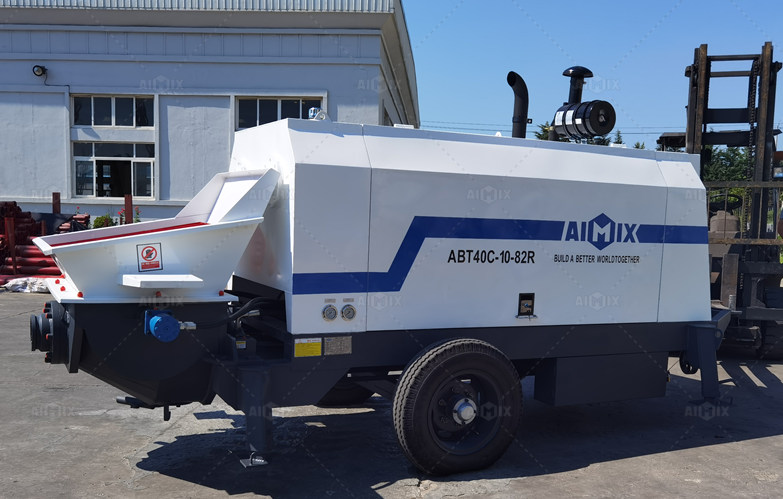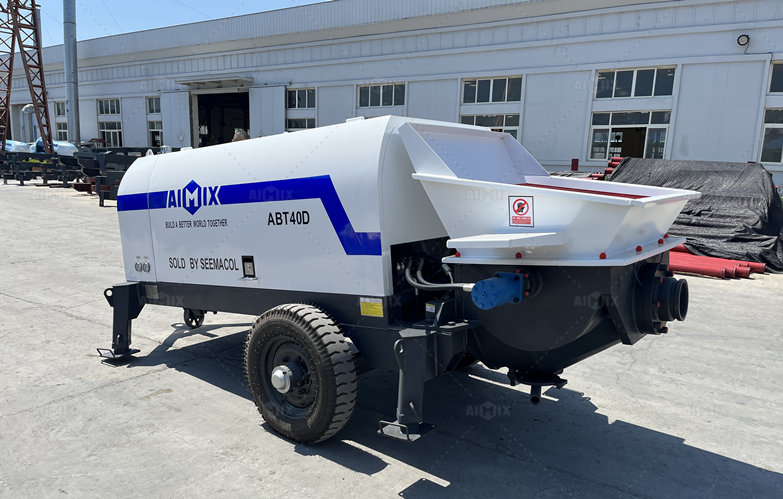Concrete pump companies play a crucial role in the construction industry by providing essential equipment such as trailer concrete pumps, which are widely used for their portability and efficiency. To meet the diverse needs of construction projects, these companies must carefully arrange production schedules to ensure timely delivery, optimal resource utilization, and high-quality output. In this article, we’ll explore how concrete pump companies arrange schedules for trailer concrete pump production, covering key factors such as demand forecasting, production planning, resource allocation, and quality control.

Demand Forecasting
Accurate demand forecasting is the foundation of effective production scheduling. Concrete pump companies like Aimix use various methods to predict the demand for trailer concrete pumps.
Market Analysis
Industry Trends: Analyze industry trends and market conditions to anticipate future demand for trailer concrete pumps.
Customer Feedback: Gather feedback from customers to understand their needs and preferences, which can inform production planning.
Historical Data
Sales Data: Use historical sales data to identify patterns and trends in demand for trailer concrete pumps.
Seasonal Variations: Consider seasonal variations in demand, such as increased construction activity during certain times of the year.
Project Pipelines
Construction Projects: Monitor upcoming construction projects and infrastructure developments that may require trailer concrete pumps.
Government Contracts: Track government contracts and public sector projects that could drive demand for concrete pumps.
Production Planning
Once demand is forecasted, concrete pump companies develop detailed production plans to ensure efficient and timely production of trailer concrete pumps.
Production Capacity
Assess Capacity: Evaluate the production capacity, including the availability of machinery, labor, and materials.
Capacity Expansion: If necessary, consider expanding production capacity to meet increased demand, such as by adding new production lines or facilities.
Production Schedule
Timeline: Develop a production timeline that outlines key milestones and deadlines for each stage of the production process.
Batch Production: Plan for batch production to optimize resource utilization and minimize downtime.
Resource Allocation
Labor: Allocate labor resources efficiently, ensuring that skilled workers are available for each stage of production.
Materials: Ensure a steady supply of high-quality materials, such as steel, hydraulic components, and electrical systems, to avoid delays.
Supply Chain Management
Effective supply chain management is essential for ensuring that production schedules are met without interruptions.
Supplier Relationships
Reliable Suppliers: Establish relationships with reliable suppliers who can provide high-quality materials and components on time.
Supplier Contracts: Negotiate contracts with suppliers to secure favorable terms and ensure a steady supply of materials.
Inventory Management
Just-In-Time Inventory: Implement just-in-time inventory management to minimize storage costs and reduce the risk of material shortages.
Safety Stock: Maintain a safety stock of critical components to buffer against supply chain disruptions.
Logistics
Transportation: Plan for efficient transportation of materials and finished products to and from the production facility.
Warehousing: Optimize warehousing operations to ensure that materials and components are readily available when needed.

Quality Control
Quality control is a critical aspect of production scheduling, ensuring that trailer concrete pumps meet the required standards and specifications.
Quality Assurance
Inspection Protocols: Implement rigorous inspection protocols at each stage of the production process to identify and address defects early.
Testing: Conduct thorough testing of finished trailer concrete pumps to ensure they meet performance and safety standards.
Continuous Improvement
Feedback Loops: Establish feedback loops to gather input from customers and production staff, identifying areas for improvement.
Process Optimization: Continuously optimize production processes to enhance efficiency and quality.
Compliance
Regulatory Standards: Ensure that trailer concrete pumps comply with relevant regulatory standards and certifications.
Documentation: Maintain detailed documentation of quality control processes and inspections for accountability and traceability.
Scheduling Tools and Technologies
Concrete pump companies leverage various tools and technologies to streamline production scheduling and improve efficiency.
Production Management Software
ERP Systems: Use enterprise resource planning (ERP) systems to integrate and manage production schedules, inventory, and supply chain operations.
Scheduling Software: Implement specialized scheduling software to optimize production timelines and resource allocation.
Automation
Automated Machinery: Use automated machinery and robotics to enhance production efficiency and reduce labor costs.
IoT and Sensors: Implement IoT and sensor technologies to monitor production processes in real-time and identify potential issues early.
Data Analytics
Predictive Analytics: Use predictive analytics to forecast demand, identify production bottlenecks, and optimize schedules.
Performance Metrics: Track key performance metrics, such as production output, downtime, and defect rates, to inform decision-making.
Coordination and Communication
Effective coordination and communication are essential for ensuring that production schedules are executed smoothly.
Cross-Functional Teams
Collaboration: Foster collaboration between cross-functional teams, including production, supply chain, quality control, and sales, to align on production goals.
Regular Meetings: Hold regular meetings to review production progress, address challenges, and adjust schedules as needed.
Communication Channels
Digital Platforms: Use digital communication platforms, such as email, messaging apps, and project management tools, to facilitate real-time communication.
Transparency: Maintain transparency in communication to ensure that all stakeholders are informed and aligned on production schedules.
Contingency Planning
Risk Management: Develop contingency plans to address potential risks, such as supply chain disruptions, equipment failures, or labor shortages.
Flexibility: Build flexibility into production schedules to accommodate unexpected changes or delays.
Customer-Centric Approach
A customer-centric approach ensures that production schedules are aligned with customer needs and expectations.
Customization
Tailored Solutions: Offer customized trailer concrete pumps to meet the specific needs of different customers and projects.
Customer Input: Involve customers in the production planning process to ensure that their requirements are met.
Delivery and Installation
Timely Delivery: Ensure timely delivery of trailer concrete pumps to meet project deadlines.
Professional Installation: Provide professional installation services to ensure that pumps are set up correctly and ready for use.
After-Sales Support
Maintenance Services: Offer maintenance and repair services to keep trailer concrete pumps in optimal condition.
Customer Support: Provide responsive customer support to address any issues or concerns that arise after delivery.
Arranging production schedules for trailer concrete pumps is a complex and multifaceted process that requires careful planning, effective resource management, and a customer-centric approach. By accurately forecasting demand, optimizing production planning, managing the supply chain, implementing rigorous quality control, leveraging scheduling tools and technologies, fostering coordination and communication, and focusing on customer needs, concrete pump companies can ensure efficient and timely production of high-quality trailer concrete pumps. Whether you’re a manufacturer or a construction company or a concrete pump company, understanding these scheduling strategies can help you maximize efficiency, reduce costs, and achieve successful project outcomes. With the right approach, concrete pump companies can meet the demands of the construction industry and deliver reliable equipment that drives project success.